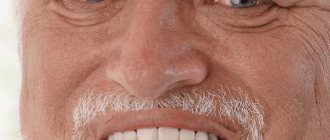What is depression and how does it manifest itself?
Depression is a condition characterized by low mood and reluctance to act, negatively affecting a person's thoughts, behavior, feelings, outlook and physical well-being.
A depressed mood appears, which causes a feeling
- Sadness
- Worries
- Voids
- Hopelessness
- Helplessness
- Guilt
- Uselessness
- Irritability
It is worth noting that depressed or depressed mood is not necessarily a mental disorder. In some cases, it may be a natural reaction to certain life events, accompanied by a symptom in certain diseases, a side effect of certain types of therapy, and so on.
From a clinical perspective, depression as an illness manifests itself in the context of bipolar disorder or recurrent depressive disorder.
Characteristic of depressive disorder
- Long-term decreased mood
- Low self-esteem
- Loss of interest in everything that previously brought pleasure
- Depressive disorder can disrupt not only the patient's family and social life, reduce productivity at work, impair sleep and change eating habits, as well as overall well-being. Severe depression may be accompanied by suicidal thoughts.
Depression is a serious social problem as it affects the patient's quality of life and ability to work, and if not treated promptly, can be fatal in some cases. Unfortunately, a very small proportion of people suffering from symptoms of depression seek medical help, which ultimately leads to their condition becoming more and more severe.
It should be noted that the sooner measures are taken to treat it, the faster you can get rid of it.
Overall, 121 million people worldwide suffer from depression. In its worst forms, it can lead to suicide. Studies of various populations show that the incidence of depression is approximately 2 times more common in women than in men.
Depression can occur in all age groups. Most people experience their first depressive episode in their 30s or 40s, followed by a slight peak in their 50s or 60s. The risk of developing depression increases with neurological diseases such as Parkinson's disease, stroke or multiple sclerosis and during the first 5 years after birth. Depressive disorders are more common in people living in urban environments than in rural areas.
Causes
Often depression in women occurs for no apparent reason. Depression in women can be triggered by hopelessness, a series of failures, everyday problems, as well as mental, physical illnesses or taking certain medications.
Today, the percentage of women suffering from depression is only increasing. The cause is multifactorial, but primarily these are changes in hormonal levels, starting from the first menstruation to the menopause. Each period has its own signs of depression.
Types of depression and their symptoms
Depression is usually characterized by a decrease in mental and physical activity, depressed mood, behavioral changes, disturbances in certain physiological processes (nutrition, sleep, sexual activity) and others. Despite the common features of most depressive conditions, they can be divided into several different groups depending on certain features of their manifestation and the severity of symptoms.
The main types of depression are depression with anxiety, acute depression, postpartum depression, depression in the elderly, psychotic depression, atypical depression, bipolar depression and depression due to misuse of various substances.
Depression with anxiety
Characterized by increased anxiety, restlessness, and decreased resistance to stress. Risk factors for developing depression with anxiety are associated with mental illness, clearly low self-esteem or low social status, lack of social contacts and family support, and frequent stressful situations. People with this disorder experience deteriorating productivity and productivity, loss of interest in professional responsibilities, a desire to avoid social contacts, and may also abuse alcohol or drugs.
Acute depression
Characterized by low self-esteem, melancholy, and depressed mood. A decrease in motor activity and deterioration in mental activity are possible.
Depression caused by psychological trauma in childhood
Most events in childhood do not go unnoticed, and in the future can cause the development of depression. This often happens when there was a psychological trauma in childhood, which subsequently changes behavior and life not for the better.
Depression as a reaction to severe stress
This type of depression can be caused by acute psychosocial trauma, such as the loss of a relative, divorce, job loss, or forced emigration. In some cases, the depressive reaction may be more severe. For several months and sometimes years after separation, some people may feel melancholy, sadness, as well as apathy, insomnia and pessimism.
Postpartum depression
This type of depression first appears 3 months after the birth of the child. Psychological factors, such as lack of support from partners or unwanted pregnancy, are also thought to play an important role in the development of postpartum depression. Various epidemiological data indicate the incidence of this type of depression ranging from 5% to 25%. In addition to women, postpartum depression can also affect the baby's father. The main symptoms that are observed are sadness, fatigue, disturbances in sleep and eating habits, decreased libido, anxiety, irritability and much more.
Depression in older people
Depression occurs in those older people who do not have normal family relationships but often have risk factors for cardiovascular disease such as hypertension, diabetes, smoking or hypercholesterolemia. Patients describe a gradual loss of energy and interest in certain activities. Cognitive tests may reveal impairments.
Psychotic depression
This form of depression is associated with hallucinations, delusions, and severe impairment of the ability to work and perform social functions. More than half of the patients had hyperactivity of the hypothalamic-pituitary-adrenal axis, measured using the dexamethasone test. In psychotic depression, the use of antipsychotic drugs in addition to antidepressant therapy is recommended.
Psychotic depression - characterized by severe painful depressive mood (dysthymia), slow thought processes and reduced activity (hippocampus). Symptoms also include hallucinations, delusions, psychomotor retardation or stupor, to the extent that normal social activities are impossible.
Atypical depression
This subtype of depression is characterized by hypersomnia (increased need for sleep, daytime sleepiness) and hyperphagia (increased appetite). It is the opposite of acute depression, which is characterized by insomnia and weight loss.
But on the other hand, in patients with atypical depression, anxiety, including panic disorder and social phobia, is more common, and there is a higher risk of suicide and a tendency to abuse alcohol and drugs.
Depression in bipolar disorder
Depression in bipolar disorder occurs in patients with pre-existing episodes of depression. Bipolar disorder is a condition characterized by alternating episodes of high mood with depressed mood (depression).
A few years earlier...
Before a guy and a girl became husband and wife, they were the bride and groom. Love relationships are the most difficult in the world. Love can be insidious and unrequited. And here, too, we are haunted by the same myth that the fairer sex is more vulnerable, and this is supposedly fraught with even suicide attempts. For better or worse, age groups have their own psychological problems, only the symptoms of depression in girls are also no different from those found in boys. Even the restructuring of the body in connection with sexual maturation gives almost the same picture. Boys and girls alike can be short-tempered, irritable or withdrawn.
Worth seeing: Depression due to work
Causes of depression in women
It is known that the living environment, relationships with other people, children's education and other social and environmental factors play an important role in shaping the human psyche and, consequently, in the occurrence of certain mental illnesses. There are a number of factors that contribute to an increased likelihood of depression. These could be:
- History of physical, mental or sexual abuse;
- Taking certain medications - beta blockers, reserpine, barbiturates, benzodiazepines and others;
- Conflicts with close friends, work colleagues, neighbors or family members;
- Death or loss of a loved one;
- Starting a new job, school, marriage, job loss, divorce, retirement and other important life events
- Chronic diseases (diabetes, heart disease, arthritis, AIDS, multiple sclerosis, etc.), cancer;
- Abuse of drugs, alcohol or other substances.
- Having a baby (postpartum depression).
- Genetic predisposition if you have a family history of depression
- Disruption of biochemical processes in the brain, when there is a chronic lack of important neurotransmitters, including serotonin. Disorders may occur due to the use of certain medications, such as hormonal medications.
- By biological factors we must understand the biological characteristics of the body that contribute to the development of depression. Researchers have identified differences between the brains of depressed people and healthy people. For example, the hippocampus, a small part of the brain that plays an important role in storing memories, is smaller in people with depression than in those who do not suffer from it. A smaller hippocampus has fewer serotonin receptors.
- There are also hypotheses that suggest the participation of norepinephrine and dopamine in the development of depression.
- Some experts believe that people with depression are simply born with a smaller hippocampus and are therefore prone to depression.
Reactions to somatic diseases
Physical illnesses of the body are called somatic, in contrast to mental disorders. In psychosomatics, depression is considered one of the most somatized mental disorders - that is, depression significantly affects the somatic functions of the body.
Depending on the genesis, there are several mechanisms for the development of depression in somatic diseases:
- nosogenic;
- organic;
- somatogenic.
Nosogenic depression is a psychogenic depressive reaction that occurs in patients with somatic and neurological pathologies. The reaction occurs as a response to the influence of psychological, personal, social and biological factors, including external manifestations of a physiological disease. Typically, this form occurs after the announcement of a serious diagnosis, with an unfavorable course of the disease that threatens the patient’s life.
If there is a deterioration in well-being and significant bodily discomfort, this can aggravate the patient’s mental state, disturbing him with panic attacks and anxiety attacks.
Doctors distinguish short-term and long-term nosogenic depression. In the first case, the disease lasts up to 2 months and is formed as a reaction to a message about a diagnosed disease, when the patient regards this as a catastrophe that has befallen him. The patient tends to dramatize the situation, he has a pessimistic outlook on life, anxiety and a feeling of powerlessness.
Symptoms of depression in women
- Decreased activity
A decrease in activity at the onset of a depressive disorder is manifested in a subjective feeling of lack of strength, fatigue, and weakness. Gradually, patients move into a state of uncertainty, indecision and laziness. There is a pronounced strong decline, a decrease in activity, a complete loss of interests and initiative. Psychomotor depression is steadily increasing.
A person pays less attention to his appearance and hygiene. Movement slows down, and patients may spend most of their time in bed, completely relaxed, or they may experience tension and anxiety. In particularly severe depressive episodes, patients cannot cry, tears decrease sharply, eyes are dry, and blinks rarely.
In some cases, deep motor depression can develop into depressive stupor, characterized by complete immobility, inability to establish verbal contact and refusal to eat.
- Mental process disorders
Mental process disorders are closely related to emotional anxiety. The thinking process becomes suppressed and it takes a long time to think. The rate of associative flow decreases, the concept of consistency in the performance of various activities disappears, and patients experience great difficulty even in performing their usual work.
Thus, they become increasingly insecure and anxious people. Subsequently, various feelings of inferiority appear, as well as fears or beliefs about the loss of inherent qualities.
- Depressed mood
In depressive disorders, many illusions can often be observed. Too typical misconceptions in depression about the presence of a serious and unknown illness, reluctance to live, thoughts of death or suicide.
Hypochondriacal delusions tend to be more common in late-onset depression. Patients are convinced that they are suffering from an incurable disease, that they are infected with cancer or another serious illness. Thoughts arise that internal organs do not work or are missing, parts of the body are rotting, the patient is a “living corpse” (Cotard syndrome).
- Somatic and autonomic changes in depression
Somato-vegetative changes in depression deserve special attention, since in many cases they are the basis of the first complaints for which depression seeks medical help. The most common disorders during depression include insomnia, malaise, sexual dysfunction and headaches. Typical autonomic disorders are tachycardia, dilated pupils, dry mucous membranes and constipation, which are a manifestation of depressive sympathy. Reverse Argyll-Robertson sign observed
Insomnia (insomnia) is considered a major symptom of depression. Typical depression is characterized by early morning awakening, which leads to a significant reduction in total sleep duration. Regardless of increasing and early drowsiness in the evening, patients have difficulty falling asleep. Their sleep is usually shallow with frequent awakenings and can sometimes be accompanied by nightmares. In some forms of depression, instead of insomnia, there is hypersomnia - sleep of 10-12 hours or more.
Pain (anorexia) is a very common complaint with depression.
Sexual disorders, expressed in decreased or absent libido and loss of potency,
The cause of headaches may be high blood pressure, which is common in depressive disorders, especially in older people. Accompanied by asthenia, anxiety, and a feeling of tension.
Test
You can take a simple test to determine if you are depressed.
The main symptoms of depression are:
- sadness and depressed mood;
- increased fatigue;
- indifference to the joys of life and pleasures.
Additional signs are:
- low self-esteem;
- lack of prospects for the future;
- sleep disturbance;
- loss of appetite;
- diffidence;
- a feeling of guilt that accompanies constantly;
- thoughts of suicide;
- attention disorder.
From the lists above, you need to select signs that describe the current state of a person.
- If four additional signs and three main ones correspond, this is depression in a severe stage.
- If three additional signs and four main signs correspond, this is depression of moderate severity.
- If two additional and two main signs of depression correspond, this is a mild stage.
To more accurately determine the condition, you can take the Sheehan test, which will determine the level of anxiety. Or take the Zang Scale test, which will help identify depressive disorders.
If you detect signs of depression, it is best to contact an experienced psychotherapist for an accurate diagnosis and prescription of special medications.
Treating depression without antidepressants at home
Most patients with depression feel helpless and tend to rely on medications, but forget that there are many other ways to overcome depressive symptoms.
Behavioral changes play an important role in treating depression without antidepressants at home - physical activity, a healthy lifestyle, thinking, which in turn is a natural way to combat depression.
- Plan your day
The main thing here is to avoid routine and monotony. Creating a daily schedule can help solve this problem.
- Set yourself goals and achieve them
When a person is depressed, they often feel like they can't achieve anything. This makes depression even worse. To overcome this feeling, you need to set daily small goals, the achievement of which will lift your spirit and mood. Over time, goals can become increasingly difficult.
- Physical exercise
The benefit of physical exercise is that it promotes the release of endorphins - pleasure hormones. Frequent exercise helps stimulate brain activity. Excessive loads are not required. The main thing is to do at least simple exercises and regularly. It has long been noted that physical activity helps improve mood.
- Healthy eating
There is no specific diet to treat depression, but maintaining good eating habits can help overcome depression.
If the patient's depression often leads to overeating, controlling the diet may improve the patient's self-esteem. According to some authors, foods rich in omega-3 fatty acids (salmon and tuna) and folic acid (spinach, avocado) may help treat depression.
- Full sleep
Depression can lead to sleep deprivation, but depriving yourself of sleep can make depression worse. To overcome this vicious cycle, lifestyle changes are necessary. For example, it is recommended to go to bed and get up at a certain time every day. It is advisable to avoid napping during the day. For timely and quick sleep, it is not recommended to keep a TV or computer in the bedroom.
- Changing your thinking
The fight against depression is mostly mental. When a person is depressed, he always comes to the worst conclusions when assessing the situation. In these cases, it is advisable to resort to a logical solution to these negative thoughts.
- Take medications for depression only after consulting your doctor
Consult a professional before taking any supplements that are thought to help treat depression.
- Do something new
It is recommended that people suffering from depression try new things. This could be, for example, visiting a museum, reading a book in the park, learning a new language. Some authors argue that when we find ourselves in a situation where we start doing something new, various chemical changes occur in the brain. Trying something new changes dopamine levels in the brain, which is associated with feelings of pleasure and joy.
Prevalence of depression in modern times
Today, depression as a mental disorder is one of the most common illnesses in the world. At the same time, the risk of developing the disease (mainly a major depressive episode) is 15-20%. According to data, about 25% of women and almost 12% of men have experienced depression at least once, which would require treatment.
So in modern Sweden, depression is the first most common reason for taking out sick leave, and in the USA it is the second. Over 25% of people who consulted general practitioners had depressive disorders. At the same time, studies claim that about 50% of those with depressive disorder do not seek help from specialists at all, and of those who do, only 25% visit a psychiatrist.
More recently, the peak incidence rate occurred among representatives of the “middle” generation aged 30 to 40 years. Today, this mental disorder has become significantly “younger” and is often recorded in a group of people under 25 years of age.
The main threat of depression is that someone with the disease is 35 times more likely to attempt suicide than someone without the disorder. According to WHO, 50% of people suffering from endogenous depression and 20% of patients with psychogenic depression attempt to commit suicide. About 60% of all completed suicides on the planet are committed by people suffering from depression.
How to get rid of depression on your own, advice from a psychologist
Analyze your condition. It is important to find the reasons why depression occurred, how it started, and decide on solutions to important problems and changes in life.
Eliminate everything unnecessary, outdated, that only brings worries and suffering. This mainly applies to relationships that do not bring anything good. It is also useful to surround yourself with more positive information and limit the flow of negative information.
Don't be afraid of your condition. It indicates that something needs to be changed in life and the sooner the better.
- Don't be afraid of loneliness
Some people with depression try to get rid of their depressed mood by increasing the amount of meaningless communication and empty time spent. When, in solitude, you can take a good look inside yourself, understand your inner world of emotions and feelings, rethink the situation and find the right way out.
- Don't dwell on grievances
If you constantly replay situations that have occurred that caused resentment and engage in self-criticism and self-examination, then in this way you can only increase the severity of depression. If negativity comes from other people, then it is better not to allow it into your life, to limit contacts.
- Don't forget to develop willpower
Usually, when a person is depressed, he doesn’t want to do much, laziness, indifference, and apathy appear. When how to develop willpower means doing through I don’t want, because I have to.
- Get rid of negative emotions
You need to learn to control your emotions and not let them guide your actions and life.
Impact of depression on physical health
There are two mechanisms by which depression affects physical health. Firstly, there is somatization, in which we are not talking about physical health, but about the symptoms that a person experiences as violations of physical health. Often, with depression, a person experiences so-called psychalgia, that is, painful sensations in different parts of the body. However, medical research does not lead to any results. But a person systematically suffers physically: he may have a severe headache or, for example, a knee; In addition, there are stomach or heart pains.
Another mechanism is the effect of depression on health, on changes in body tissues that are associated with depression. Depression itself does not cause damage to internal organs. But a person who is depressed often leads an unhealthy lifestyle. Having a gloomy outlook on the state of things in life, he may not consult doctors or, conversely, consult too often. The physiological and biochemical components of depression have not been fully studied. As for psychology, there are also many blank spots here, in particular in the description of family and cultural mechanisms of depression. Scientists are trying to understand why, for example, in southern countries there are fewer patients with depression than in northern ones, but at the same time in India there are more people with depression than in the whole world.
Treating depression at home with folk remedies
Methods of dealing with this unpleasant mental state can be different. If you'd rather bet on proven home remedies for depression, you won't have any trouble finding them. St. John's wort, ginseng, cardamom and ginger calm the nervous system.
In case of depression, it is recommended to eat apples, honey and chicken. Taking vitamins and supplements containing omega-3 fatty acids is important.
If you prefer medical treatment over drugs, you can consult a psychotherapist who will give you the right treatment. The most commonly used antidepressants are cispalex, deanxit, zoloft, amitriptyline, biflox, paroxetine.
Homeopathy, therapy and hypnosis are also good options to combat depression.
- St. John's wort
This herb, known to many, has an incredible effect on depression, insomnia and neurosis. If you have any of these symptoms, St. John's wort will calm you down and restore your inner peace. You can make tea based on it, as well as take tablets with St. John's wort extract.
- Ginseng
Ginseng tones the body, strengthens the immune system, relieves fatigue, improves concentration and memory.
To treat depression, you can make tea with ginseng or take herbal tablets based on it. The combination of ginseng and honey is also effective in combating bad mood.
- Cardamom
The aromatic spice is widely used in Indian cuisine. To get rid of depression and bad mood, add half a teaspoon of the product to a glass of hot water. Drink it as a tea once a day and you will soon feel an improvement in your condition.
- Ginger
Ginger, like cardamom, is a spice used in Indian and Asian cuisine. It is characterized by a pungent taste that gives dishes a spicy and unique taste.
In recent years, the use of ginger root tea has become widespread. Its healing properties have no boundaries. The plant successfully treats sore throat, colds, upset stomach and nervous disorders.
To overcome depression, make tea from the root of the magic spice. Add honey and a slice of lemon. The drink calms the nerves well.
- Saffron
The tea of this plant calms and tones the body. It is effective against depression and other similar conditions.
When preparing saffron decoction, do not overdo the amount of product, because it has a strong and pungent aroma.
- Asparagus
If you suffer from depression, include asparagus in your menu. This vegetable also contains substances that have a positive effect on mood.
- Apples
Apples are rich in vitamin B and other beneficial substances that successfully fight the symptoms of depression.
To cope with this unpleasant condition, it is enough to eat at least one apple a day.
- Honey
Often in a state of depression there is a feeling of hunger and a desire to eat something sweet.
Instead of a cake with pastries and pastries, eat a spoonful of honey. This product, apart from being healthy and healthy, will satisfy your hunger.
Honey strengthens the immune system and has a calming effect. It is rich in amino acids that have a positive effect on the body.
To combat depression, mix a few spoons of honey with a handful of almonds. Take a teaspoon every morning and evening.
- Chicken soup
Chicken is a food rich in tyrosine, an amino acid essential for your good mood. Chicken soup is an easy meal that suits every season.
- Nutritional Supplements: Omega-3 Fatty Acids
Omega-3 fatty acids are very important for your mood and tone.
Recent experiments conducted under the supervision of American scientists have shown that taking these supplements helps overcome depression.
Omega-3 fatty acids are found in fish, flaxseeds, walnuts, spinach, pumpkin, flaxseed oil or walnuts.
For your convenience, you can buy omega-3 fatty acids in supplement form to take daily.
- Fish fat
Fish oil is one of the richest omega-3 fatty acids. This is a dietary supplement that you can find in any pharmacy.
The product has been shown to have a positive effect on anxiety, depression and irritability.
- Vitamin B6
The lack of vitamin B6 in the body leads to a decrease in the amount of serotonin. As already mentioned, this hormone is responsible for good mood and normal mental state.
Foods rich in this vitamin are tuna, prunes, bananas, avocados.
You can take the vitamin as a dietary supplement. This product is on the shelves of every pharmacy.
- Bach drops
Dr. Bach's drops are a good alternative for getting rid of bad mood and depression. They are made entirely from flowers, and according to their creator, each flower successfully cures a specific disease.
The purpose of Bach drops is to calm the nervous system, eliminate tension and depression, and restore inner peace. It is important to note that the product is completely safe and non-addictive.
- Homeopathy
Pharmacies are home to homeopathic products that can help you with fatigue, depression, anxiety, indecisiveness, fear, apathy and other symptoms of depression. These products can be taken along with other medications or on their own. But always after consulting a doctor.
Classification of depression
There are five types of depression, let's look at which ones:
The first type is major or clinical depression. The peculiarity of this condition is an apathetic mood, rapid fatigue, loss of appetite, sleep disturbance, lack of interest in life, loss of interest in hobbies, decreased energy, suicidal thoughts, sometimes aggression and rage occur.
The second type of depression is minor depression. With this type of depression, many of the symptoms of major depression persist, but there are no suicidal thoughts and the person still partially retains interest in life.
The third type of depression is atypical depression. Many of the symptoms of major depression are present in this condition, but drowsiness and possible aggressiveness are more pronounced.
The fourth type of depression is postpartum. Everything is simple here: during childbirth, a woman experiences enormous emotional and physical stress, emotional breakdowns and depression often occur.
The fifth type of depression is called recurrent depression. The symptoms are equivalent to major depression, but such depression manifests itself cyclically, and can occur once a month with varying durations.
And the last, sixth type of depression is dysthymia. This type of depression is expressed in low mood, while other symptoms of depression may be absent. However, it is this type of depression that most often develops into major depression.
Depression pills without prescription
- Maprotiline
- Prozac
- Paxil
- Deprim
- Leuzea extract
- Ginseng tincture
- Schisandra tincture
- Azafen
- Persen
- Mianserin
- Amitriptyline
- Mirtazapine
- Novo-passit
- Hawthorn tincture
- Valerian tincture
- Neuroplant
- Gelarium
- Negrustin
- Glycine
- Anafranil
- Afobazole
- Tenoten
- Pyrazidol












